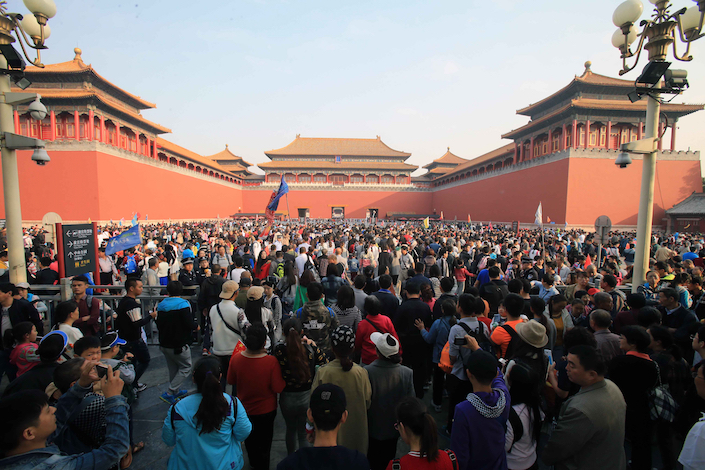The Best Reads of the Week From Caixin
Dear reader:
The “Super Golden Week,” combining the National Day and Mid-Autumn Festival holidays, has meant that more than 700 million people in China have been on vacation. But there has still been plenty of interesting news out of China this week.
Many of those tourists were headed for the Forbidden City, one of China’s top tourist attractions and the former residence of the Ming and Qing emperors. But some were left disappointed: The Forbidden City has now gone to internet-only sales of tickets, and those available had gone fast.
The idea behind internet-only sales was convenience. In a country with the world’s largest internet population — 700 million people — convenience is very much on the minds of businesses and consumers, who are used to pulling out their smartphones to buy everything from a Starbucks latte to a cab ride. One of the latest experiments has been with unstaffed “smart stores,” and retail and e-commerce giants Alibaba and JD.com are among those piling in.
Everywhere you look in rapidly developing China, you will see that a lot of experimenting is going on. Not all of the experiments have made for happy neighbors. A government requirement that luxury property developers include affordable housing in complexes has led to a ruckus. Walls and gates have been erected to separate rich and poor neighbors, with lush gardens off limits to those living in the cheaper units.
Another ruckus has been made by investors in an Inner Mongolian fertilizer-maker that defaulted on a $120 million bond. They are learning that they were wrong to assume the government would bail out any issuer that turned out to be unable to repay investors.
Meanwhile, biotechnology and other new-economy sectors contributed less to China’s overall economy in September, falling to a three-month low, the latest Mastercard Caixin BBD China New Economy Index shows.
These are five stories that I don’t want you to miss. Please share your comments on The Weekender section and on our other coverage at news@caixin.com.
Kind regards,
Deb Price
Managing editor, Caixin Global
Low-Tech Holiday-Makers Walled Out as Forbidden City Tickets Go Online-Only
Famous Beijing tourist attraction’s move to all-internet sales follows three-month trial aimed at improving crowd flows
 |
Beijing’s Forbidden City, which has been experimenting with online ticket sales since 2011, formally rolled out the new system to kick off the week-long National Day holiday that started Oct. 1. Photo: IC |
Unstaffed ‘Smart Stores’ Save Owners Money, but Still Make Dumb Mistakes
Trendy robotic shops are attracting big names like Alibaba and JD.com, but also thieves and computer glitches
 |
Although the number of traditional convenience stores in China has tripled since 2009, staff costs remain an issue. To lower these costs, the industry is looking at staffless convenience stores. China hosted its first industry expo (pictured) for the automated shops in September in Shanghai. Photo: IC |
Rich and Poor Are Neighbors — but Divided by Walls
Outcry grows over gates that keep affordable housing occupants out of gardens enjoyed by developments’ wealthier residents
 |
On one side of the gated wall (pictured) dividing a residential compound in Beijing, homes were sold to low-income families for 21,000 yuan ($3,150) per square meter. On the other side, residents spent between 100,000 and 160,000 yuan a square meter for an area with far more lush green space. Photo: Huang Ziyi |
Hopes Dim for Investors as Fertilizer-Maker’s Bond Defaults
Regulators’ responses indicate bondholders should stop expecting government bailout for Nailun’s default
 |
Guo Zhanchun, founder of fertilizer-maker Inner Mongolia Nailun Group Inc., has left some 1,200 retail investors in Nailun’s bonds with dim hopes of recovering their investment. The seven-year 800 million yuan ($120 million) note issued in 2011 was the first exchange-traded bond to default on China’s bond market. Photo: Xinhua |
New Economy Index Slides to Three-Month Low
Biotechnology, other value-added sectors contribute less in September to overall economy, Mastercard Caixin BBD China NEI shows
 |
New economy industries fell to 29.6% of total economic inputs used to make goods and services last month, down from 33.3% in August, according to the latest Mastercard Caixin BBD China New Economy Index. The index aims to gauge the size and change in China’s nascent value-added industries such as biotechnology and research and development. Photo: IC |

- 1China Officials Dismiss Tax Hike Rumors After Tech Selloff
- 2Cover Story: How Gutter Oil Became a Prized Fuel for International Airlines
- 3Prominent Chinese Journalist Liu Hu Detained by Police in Chengdu
- 4Maersk Unit Takes Over CK Hutchison Panama Ports After Court Ruling
- 5China Provinces Set Cautious 2026 Growth Targets
- 1Power To The People: Pintec Serves A Booming Consumer Class
- 2Largest hotel group in Europe accepts UnionPay
- 3UnionPay mobile QuickPass debuts in Hong Kong
- 4UnionPay International launches premium catering privilege U Dining Collection
- 5UnionPay International’s U Plan has covered over 1600 stores overseas






